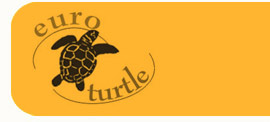
This
green sea turtle was only 19 centimetres long, yet had
consumed 76 pieces of plastic! Another turtle died after
passing 107 items, including plastic, rope, fishing line-
and even part of a clothes peg!

This turtle was washed ashore barely alive, near comatose.
Sadly it was a turtle that had already been in care and
released by the Australian Seabird Rescue 2 months earlier.
When they conducted the necropsy the turtle’s stomach
appeared to be full but below the small intestines were
empty- something had blocked the passage of food.
Exploring
further they discovered the culprit, at the bottom of
the stomach (the pylorus) several thin ribbons of plastic
were entwined in fibrous food matter preventing the food
from passing into the intestine.

The
plastic ‘ribbon-like’ material (washed and
replaced in this image)
had most probably come from a rural feed bag.
The
propulsion of food through the digestive tract would have
reduced rapidly making the faecal matter to dry out and
compact. This turtle would have died from starvation,
peritonitis (inflammation of organs) and other factors
caused from not passing food.
The
alarming truth is that even if ALL plastic production
was to stop now, we would still have to face to problem
for 400 or more years to come. As humans we have to accept
the responsibility of our actions on the natural environment
and embark collectively to mitigate the impacts as much
as possible. The victims of our carelessness die a slow
and painful death that no creature should have to endure.
Source:
Necropsy Report, conducted by Lance Ferris, Australian
Seabird Rescue: http://www.seabirdrescue.org/
and emails circulated by Lance Ferris on C-TURTLE list
server: seabirdrescue@bigpond.com
Lance
“Pelican Man” Ferris sadly passed away (12/10/2007)
during the creation of this website and we would like
to pay tribute to his passion, enthusiasm and dedication
to the rescue and rehabilitation of marine wildlife in
Australia.





